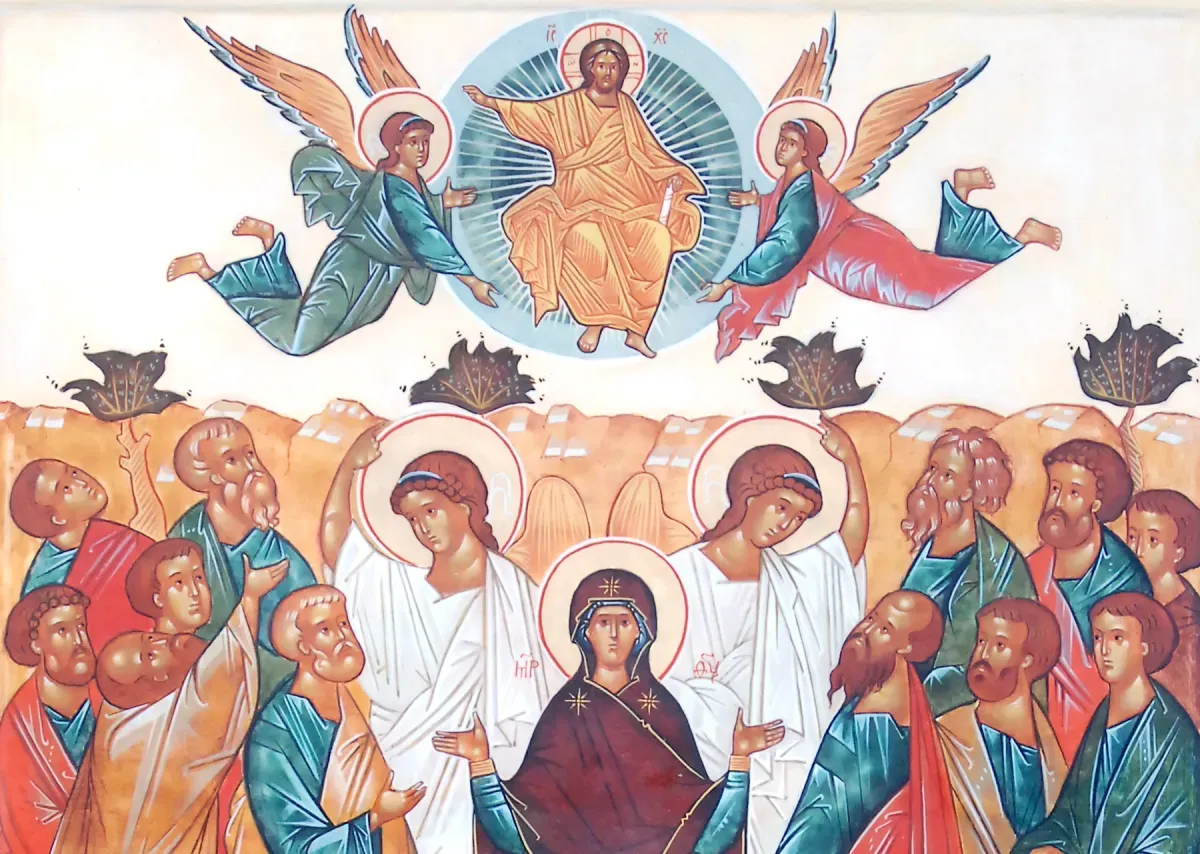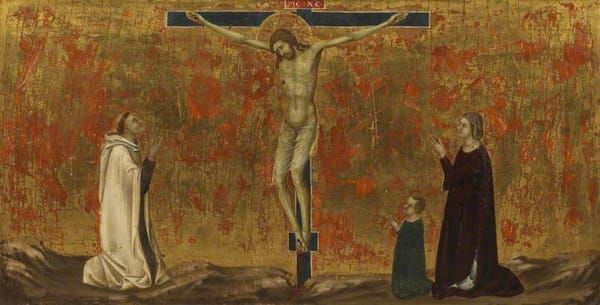A Heartfelt Rejoinder to Eugenia Constantinou: Discovering the Orthodox Phronema in Universalism (Part Three)
Universalism is rooted in the Scriptures and the Fathers, and no authoritative statements in Tradition condemn the belief.

How to Approach the Fathers
At the end of Part Two, I explained how the concept of phronema in the way Constantinou uses it seems to lead to circularity of argumentation as many candidates seem poised to possess phronema despite their disagreements. This dovetails nicely into Constantinou's discussion about how the Orthodox should approach the Fathers. She is right that Orthodox Christians cannot simply appeal to "The Fathers say…"1 These vacuous statements are disingenuous as they gloss over the disagreements between saints and don't provide substantive reasoned-out arguments for a position. "The Fathers" do not speak with one voice, but rather many voices, and sometimes even competing ones. She notes that taking the Fathers out of context is also spiritually unsafe. The words of the Fathers are to be valued, and while the Fathers are sometimes unclear about their positions, one should not haphazardly appeal to them. There is thus no "proof text" to be found in the Fathers. The Fathers must be approached and understood in their historical and theological milieu.2 Universalism is relevant here because I disagree with some of my fellow universalists who overestimate the credence that certain Fathers were universalists. In the Introduction of Grace Abounds I employ methodologically rigorous sub-categories to measure my credence on any given figure. The last thing I want to do is offend one of the saints who intercede for our continued growth in theosis or deification.
With that said, when one actively engages with the Fathers, it becomes evident who is good at making arguments in favor of their positions and who is not so good at making arguments in favor of their positions. You can be a very holy person of the Church for the life you lived yet not have a great philosophical or theological rigor behind your argumentation. We humbly refer to these figures in the Church as "fools for Christ." Many holy monks who lived in seclusion during the late patristic age fit the bill. They lived virtuous lives with only the law written on their hearts. Many ancient and modern saintly figures are not "fools for Christ," yet they aren't well-studied in philosophy or theology. Or, perhaps more common in our day, they are well aware of a specific theological field because they studied it in seminary or university but often delve outside to discuss topics they have not studied to the same extent. An example could be a liturgical scholar who writes on ecclesial decisions without having studied much about how these decisions were reached, the political and theological impetus behind those decisions, and the culminating events leading to those decisions; history does not occur in a vacuum. This should not be looked down upon, as none of us can be experts or even novices in everything; but it is to say that we should consider the saint's background in the relevant field before resorting to a quotation of their beliefs on the topic.3
Everything said here, I believe, is in line with Constantinou's statement that Orthodox Christians are called to be "reason-endowed sheep."4 As St John Chrysostom claims, reason and the soul's immortality are two universal truths about humanity handed down from Greek philosophy. Since we are reason-endowed sheep, we should consider the actual arguments of the Fathers and not simply a certain Father because we already like what they say on a particular topic, and we see a crisp "St" title or another ecclesial title next to their name, giving them an authoritative voice. When I examine the arguments made by the Fathers both ancient and modern, in favor of universalism, and I examine the arguments made against universalism by Fathers both ancient and modern, I cannot help but often notice a difference in the theological and logical rigor of the arguments. Not to say that all non-universalist Fathers do not make their positions well, but the universalist Fathers come out on top. They consistently appeal not only to one or two proof texts in Scripture (though they do this too) but to the entire theological basis of Christianity and the Incarnation of Jesus Christ.
Here is just one example from St Gregory of Nyssa: "Either God will not be in all if some evil will be left in beings, or, if it is necessary to believe that God will really be in all, then, together with this conviction, it is demonstrated that there will be no evil. For it is impossible for God to be found in evil."5 Commenting on 1 Corinthians 15:28, which Metropolitan Kallistos concludes "definitely suggests […] an ultimate reconciliation,"6 Gregory brings together a response that ties eschatology to a philosophical theodicy and why, in modern terms, a qualified monistic ontology is necessary. He answers how universalism solves the problem of evil and how it demonstrates that any dualistic account of evil souls existing forever in the next Age while God is all things to everyone is ontologically incoherent. Gregory can hold that Christ will truly reign, all while being faithful to the holy words of St Paul. This seems like the perfect expression of the Gospel preached every Divine Liturgy.7
So, appealing to the words of a specific saint should not be done if that saint does not develop a convincing argument that demonstrates their awareness and comprehension of the topic. A counter-response could be that only a few Fathers explicitly argued, using Scripture and philosophy, that universalism is true. Even if this was true, which it is not, as I discussed towards the start of Part One, because Church consensus is not a justified ground to stake an argument in, this can safely be dismissed. Since one can turn to the Scriptures and the Fathers, by using our reason responsibly and not overstepping what has been considered before by the holy Fathers of the Church, we should feel comfortable in claiming that universalism should be allowed to remain a theologoumenon or respected private opinion of the pious. While I do not claim universalism has absolute doctrinal authority, and so every Orthodox must submit to this truth, I cannot say the same about many who oppose universalism.
Status of Dogma in the Church
This leads naturally to a discussion about dogma in the Church. In Part One of the series, I introduced the concept of the ecumenical council and its limits in the context of Mary's Dormition. Constantinou's statement on ecumenical councils is worth quoting at length: "Ecumenical councils are considered to possess the highest authority in Orthodox Christianity, not because they stand above the Church, just as the Scriptures are not in a position above the Church, but because the ecumenical councils and the Scriptures reflect Holy Tradition, which has always been known, experienced, and taught in and by the Church."8 I wholeheartedly agree with the first three lines, but as explained, it is best not to appeal to consensus nor to ground Tradition in the claim that it is apostolic. There is nothing tangible to ground the authority of the ecumenical councils other than our trust in Christ and His Church. There is no set of necessary and sufficient conditions that each particular council is determined to fit or not fit. This is not how the Church received councils when they occurred. It should not be how they are received today. Apophatic theology is indeed perhaps a dish best served in ecclesiology, as Fr Nikolaos Loudovikos has so clearly shown.9
Regarding dogma generally, Constantinou states, "The Orthodox Church has almost no official theological statement other than the Nicene Creed, the canons (which are ancient and sometimes contradictory), and the decisions of the seven ecumenical councils."10 On a later page, she writes, "Some examples of dogma are the Trinity, the Virgin Birth, the Incarnation, and the Resurrection of Christ."11 Constantinou decries all attempts to apply, in my words, cookie-cutter standards to dogma as Western and against the Orthodox phronema. I agree, but I would put forward a list that I believe is perhaps more comprehensive and less debatable since the "decisions of the seven ecumenical councils" should be open to revision if a historical error is committed. First, however, it is important to understand dogma's purpose. Dogma is not a set of arbitrary rules some ancient theologians devised while sitting in an armchair. In the words of St Dumitru Staniloae of blessed memory, the purpose of dogma is to preserve the human's spiritual capacity for union with God.12 Dogma's purpose is for the adherent to achieve theosis. Because theosis differs widely from person to person, such that another person's theosis may look very different from one's own, the Orthodox Church does not have many dogmas. As St Justin Popovic of blessed memory notes, dogmas are not merely ontological truths in themselves, but each one is a "wellspring of eternal life" and a source for spirituality.13 We should frequently meditate on the dogmas of the faith and contemplate how we are living them out each day.
Perhaps Fr Sergius Bulgakov cohesively sums up the dogmatic commitments morally required of every pious Orthodox.14 "[An Orthodox must believe in] the teaching on the Holy Trinity (as found in the Nicene-Constantinopolitan Creed), and mainly those about the God-man (as found in the definitions of the seven ecumenical councils)."15 Compared to Constantinou's list, it is evident that Christological decisions matter more here than historical declarations on what a certain theologian was believed to have taught. Several sub-commitments follow from this list, such as Mary's title of Theotokos. It also seems certain, as decided by Nicaea II, that the Incarnation necessitates the allowance and expectation of icon veneration. Even still, one is not morally responsible for believing much. All the dogmas we have are essential to the faith, as they have been revealed through the Holy Spirit. For this reason, if a single dogma were lost, this would impact the existence of all other dogmas since they interconnect with one another: There is no Theotokos if Christ is not the Incarnation of God, and so on. Dogmas are truths brought forth through—to use a word Constantinou repeats numerous times—the "dynamic" movement of the Holy Spirit in the Church.16 Tradition is both fixed and fluid. There is no absolute comprehensive list of dogmas in the Church, nor is dogma an afterthought for Orthodoxy. Still, one can say confidently that the belief in eternal damnation is not numbered among Orthodox dogma.17 Universalism is in the realm of theologoumenon.
Conclusion
Eugenia Constantinou's 2020 text Thinking Orthodox teaches the importance of embracing an Orthodox phronema and how acquiring this through fidelity to Tradition, the Church, and a commitment to active personal piety will allow one to successfully navigate Orthodoxy to proceed along the path of theosis. I argued in this series of three posts, especially the second and third one, that universalism fits the Orthodox phronema. Universalism is rooted in the Scriptures and the Fathers, and no authoritative statements in Tradition condemn the belief. The arguments for universalism are based on these sources and a balanced dose of humanity's faculty of reason. This reason stays within the bounds of Tradition, responsibly manages theological speculation by staying within the bounds of what the holy Nicene Fathers taught, and happily embraces the theological creativity that Orthodox theologians are called to engage in.18
"The truth will set you free." ~John 8:32
- Part Three of Grace Abounds is devoted to a philosophical justification and defense of universalism.
- Constantinou, Eugenia Scarvelis. Thinking Orthodox: Understanding and Acquiring the Orthodox Christian Mindset. Ancient Faith Publishing, 2020, 202.
- Ibid., 206.
- Constantinou agrees with this principle as she rationally dismisses those who quote ancient saints to argue in favor of young-earth creationism. Ibid., 203. The saints were not scientists, so we should not turn to them for scientific questions that are verifiable only through empirical investigation; lest we repeat the whole Galileo affair.
- Ibid., 202.
- Berghaus, Margitta, and Volker Drecoll, eds. Gregory of Nyssa: The Minor Treatises on Trinitarian Theology and Apollinarism. Boston: Brill, 2011, 454.
- Ware, Kallistos. The Inner Kingdom. Crestwood: St. Vladimir's Press, 2001, 197.
- As I am not a priest, see Fr Aidan Kimel's pastoral response to Fr Stephen De Young on a similar point. Kimel, "An Open Letter to Fr Stephen De Young: What is Orthodox Universalism."
- Constantinou, Thinking Orthodox, 143.
- See Loudovikos, Nikolaos. Church in the Making: An Apophatic Ecclesiology of Consubstantiality. St Vladimir's Press, 2015.
- Constantinou, Thinking Orthodox, 60.
- Ibid., 220.
- Stăniloae, Dumitru. Experience of God: Volume 1. Holy Cross University Press, 1998, 65.
- Popovic, Justin. Orthodox Faith and Life in Christ. Institute for Byzantine and Modern Greek Studies, 1994.
- Fr Bulgakov is not seen with an authoritative voice among the anti-universalist ilk because of the misinterpretations that plagued him in life. All I can say in response is that Bulgakov became the Uncreated Light on his deathbed as he was transfigured as a sign of the Holy Spirit that he was a holy man. This makes him possess, I believe, an immensely authoritative voice that is somewhat equal to other Fathers who have become the Light, such as St Gregory Palamas and St Seraphim of Sarov. See Reitlinger, Joanna, "The Final Days of Father Sergius Bulgakov," Sergius Bulgakov: Apocatastasis and Transfiguration. The Variable Press, 1995 for the account of Bulgakov's deathbed transfiguration.
- Bulgakov, Sergius. "Dogma and Dogmatic Theology," Living Tradition, edited by Peter Bouteneff. YMCA, 1937.
- Constantinou, Thinking Orthodox, 140, 164, 314, etc.
- I did not address liturgical texts in Part Three of this series of posts, lest it be longer than it already is. See Coates, "Christ's Victory Over Hades," Grace Abounds, for a study of the Harrowing of Hades in Orthodox liturgical texts and its relevance to universal salvation. I broadly agree with Brad Jersak's statement. There is "nothing suggestive" about universal salvation in Orthodox hymnody. Our kontaki and troparia are a "continuous bold declaration that what Christ has accomplished […] was for all of humanity, affects all humanity, and calls all humanity." He joyfully chants these with his fellow readers every Divine Liturgy. See Jersak, "'Let Every Mortal Leap for Joy:' Apocatastatic Hymnody in Orthodox Worship."
- Constantinou, Thinking Orthodox, 223.





